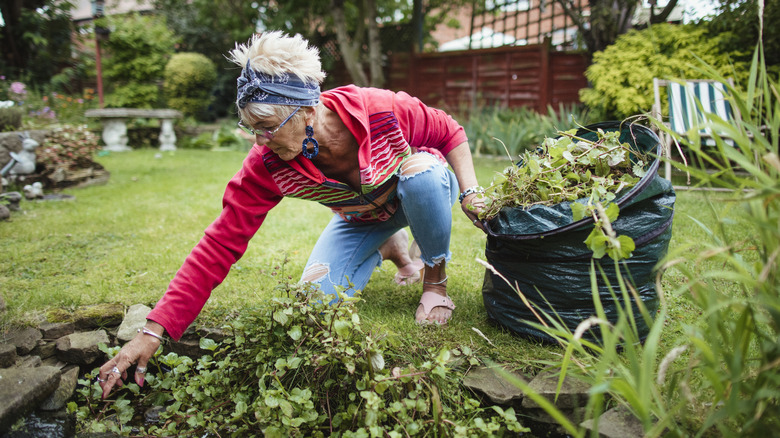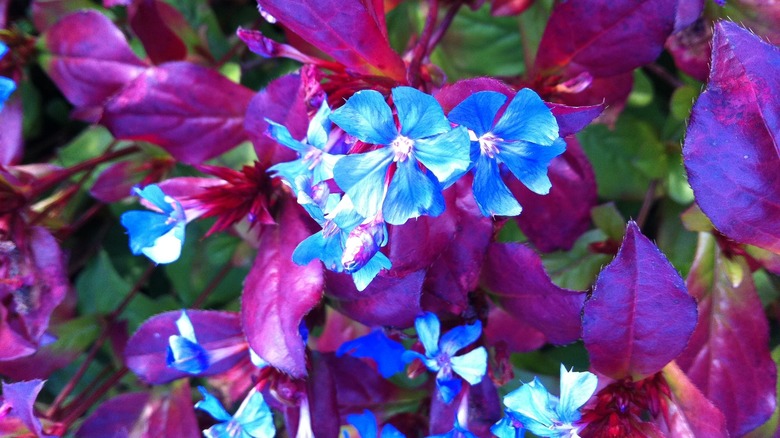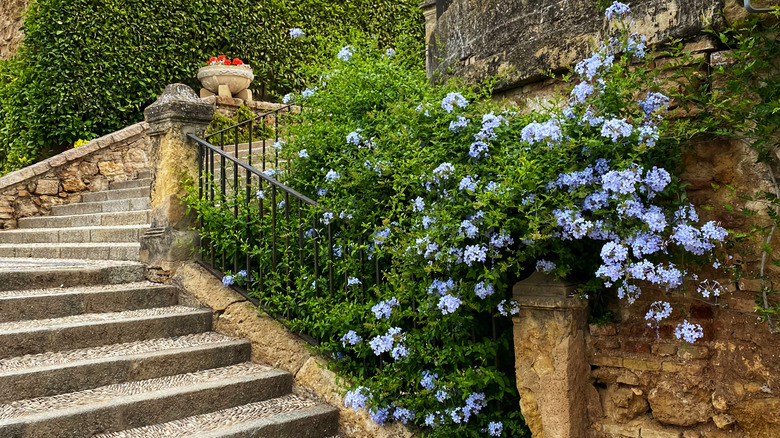Banish Weeds For Good With The Help Of This Stunning Low-Maintenance Plant
Weeds are the bane of any gardener. They kill the plants you're fighting to keep alive and ruin the otherwise perfect look of your garden or yard. This is why there are so many hacks promoted to gardeners to help remove weeds, such as the three-ingredient weed killer from Martha Stewart. Unfortunately, these hacks don't often work against the most aggressive of weeds or require a lot of upkeep to be effective. Thankfully, there is an easier solution that will keep your yard looking beautiful while also being fairly low maintenance. All you need is a stunning little ground cover plant known as plumbago. It grows in thick patches across the ground, managing to suffocate and outcompete normally pesky weeds.
This plant is also often called leadwort, dwarf plumbago, or hardy plumbago. It earned its name because it was originally considered to help cure lead poisoning. While this was later found to be false, the plant is still useful and serves other purposes. Since it's such a thick and fast-growing ground cover, it does an excellent job of out-competing the weeds you have in your yard. To identify this plant, you'll want to look for the blue flowers. The flowers first appear in late spring and contain five broad petals each. In the summer, the leaves are a bright and glossy green. However, as temperatures drop, the leaves, especially the tips, change to a deep, brown-red color.
What you need to know about plumbago
Plumbago is a useful little plant to grow in almost every yard. Not only does it have excellent weed suppression capabilities, but it's also resistant to deer. Additionally, they work quite well on sloped grounds to help prevent soil erosion and attract hummingbirds to your yard.
While this plant is pretty amazing, it's not perfect. Like all plants, it has a time and a place. Because it's a thick ground cover, it offers a quiet hiding place for animals like snakes, small rodents, and insects, which might not be good for someone scared by these types of animals. Also, because it spreads quickly, it can overpower weeds and other desirable plants in your yard if they are growing close to each other, which is why you'll have to do a lot of maintenance with plumbago. If you want something that's fuss-free and great for gardening beginners, plumbago isn't the plant for you.
Though this plant is easy to grow, it's not necessarily effortless to maintain. Plumbago is fondly referred to as an aggressive plant. Though the plant grows incredibly fast and will definitely spread if given the chance, it's not invasive like the gorgeous bush you'll regret planting in your yard. As long as you take care to direct plumbago where it needs to go and corral it quickly when it spreads, you'll have the perfect weed-blocking plant.
Getting the right plant
Before planting your plumbago, you want to make sure you pick the right plant. The scientific name of plumbago used for ground cover is Ceratostigma plumbaginoides. There is a similar species, called Chinese plumbago (Ceratostigma willmottianum). The two plants look relatively alike, with clusters of blue flowers. However, this species is a shrub, and not ground cover, like in the picture above. If you mix the two, you will end up with a bush instead of a pretty ground cover plant that fights weeds. Burmese plumbago (Ceratostigma griffithii) is another similar species with blue flowers that grows like a shrub instead of ground cover.
There are also a few species that have similar-sounding names. Plumbago auriculata, also known as cape plumbago, is native to South Africa and a completely different plant from the dwarf plumbago you want growing in your yard. Though they both have blue flowers, the care and requirements for cape plumbago and ground cover plumbago are very different. Additionally, while dwarf plumbago is nontoxic to cats, dogs, horses, and people, species in the actual Plumbago genre aren't quite as safe. They can cause mild irritation if you touch any part of the plant with your bare skin and might irritate your pets as well.


